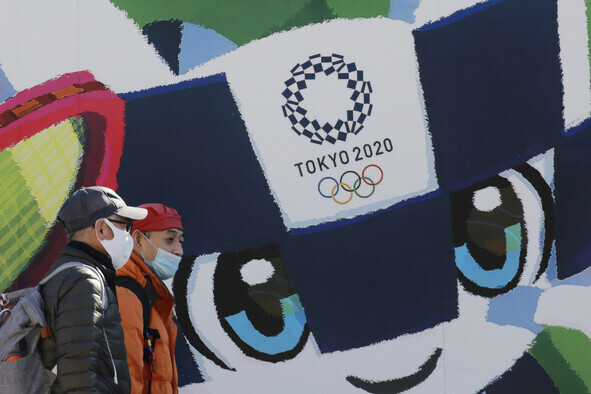The hurdles facing Japan when it comes to holding the Tokyo Olympics
전체 맥락을 이해하기 위해서는 본문 보기를 권장합니다.
In the case of skateboarding, which will be adopted as an official Olympic event for the first time, a Japanese official interviewed by the Nikkei newspaper said, "The international sports associations have talked about how they're going to hold competitions, but there hasn't been any concrete information about things like the schedule for qualifiers."
Japan is currently watching developments in the US closely. The Mainichi Shimbun newspaper noted that it was the "US that set the stage for the move to postpone the Olympics for the first time ever last year."
이 글자크기로 변경됩니다.
(예시) 가장 빠른 뉴스가 있고 다양한 정보, 쌍방향 소통이 숨쉬는 다음뉴스를 만나보세요. 다음뉴스는 국내외 주요이슈와 실시간 속보, 문화생활 및 다양한 분야의 뉴스를 입체적으로 전달하고 있습니다.

The Japanese government and the International Olympic Committee (IOC) have announced plans to go ahead as scheduled with the Summer Olympics in Tokyo this July in spite of the COVID-19 pandemic.
But many serious hurdles remain. A number of still undecided issues stand to have a direct impact on the games, including the selection of athletes (currently only about halfway done), the vaccination of competitors, and the number of permissible spectators.
With only half a year left before the Tokyo Olympics are scheduled to open, the headaches start with the selection of athletes. According to IOC figures from Jan. 25, around 57% of the 11,000 total participating athletes have been decided. The rest will need to go through qualifying. In most events, qualifiers and world championship events are scheduled to begin in March, but with the pandemic going on schedules have yet to be finalized.
In the case of skateboarding, which will be adopted as an official Olympic event for the first time, a Japanese official interviewed by the Nikkei newspaper said, “The international sports associations have talked about how they’re going to hold competitions, but there hasn’t been any concrete information about things like the schedule for qualifiers.”
In events like gymnastics and boxing, there has been discussion of assigning Olympic berths based on factors such as past performance, which has stoked a debate over fairness.
Preventing infections among the participating athletes is another tricky issue. The IOC has promised to bear the costs to acquire vaccines for competitors. But with over 200 countries participating, – each of them with a different pandemic response and vaccination program, it remains unclear whether athletes can receive priority inoculation.
There is also no way of forcing athletes to undergo vaccination if they refuse due to concerns about side effects or other reasons. The organizing committee has said it plans to provide strict prevention measures in the event that vaccination is not possible, but the coronavirus’s long incubation period means it will be difficult to prevent completely.
The confusion has only been intensified by a recent situation in which tennis players scheduled to compete at the Australian Open, the first major of the year, were forced to quarantine for two weeks after passengers on their charter flight tested positive for COVID-19.
The limits of Japan’s healthcare system to accommodate new infections during Olympics
Meanwhile, the Japanese healthcare system does not have the reserves to accommodate additional COVID-19 patients. In a Jan. 22 talk, Toshio Nakagawa, president of the Japan Medical Association, explained, “Even now, we’re seeing frequent cases of healthcare collapses due to the large number of cases.” He also predicted that healthcare institutions “will not be able to handle” a scenario where foreign athletes are infected while participating in the Olympics.
An additional issue concerns how many spectators to allow at Olympic competitions. Kyodo News quoted IOC Chairman Thomas Bach as having said that events without spectators “may be an option.” While spectator-free events would be a way of preventing infections, they would also require athletes to compete without crowd support, and that would result in heavy economic losses. An analysis by Katsuhiro Miyamoto, an emeritus professor at Japan’s Kansai University, predicted losses of around 2.4 trillion yen (US$23.1 billion) if the Olympics go ahead without spectators.
Japan is currently watching developments in the US closely. The Mainichi Shimbun newspaper noted that it was the “US that set the stage for the move to postpone the Olympics for the first time ever last year.”
“After then President Donald Trump suggested postponing the games for a year, the US swimming, track and field, and other sports federations each began requesting a postponement,” it explained.
By Kim So-youn, staff reporter
Please direct comments or questions to [english@hani.co.kr]
Copyright © 한겨레. 무단전재 및 재배포 금지.